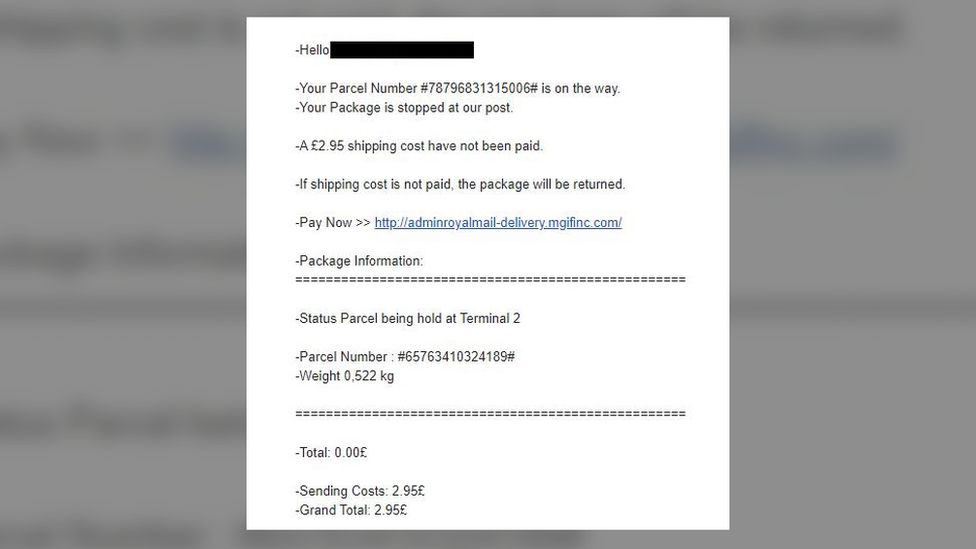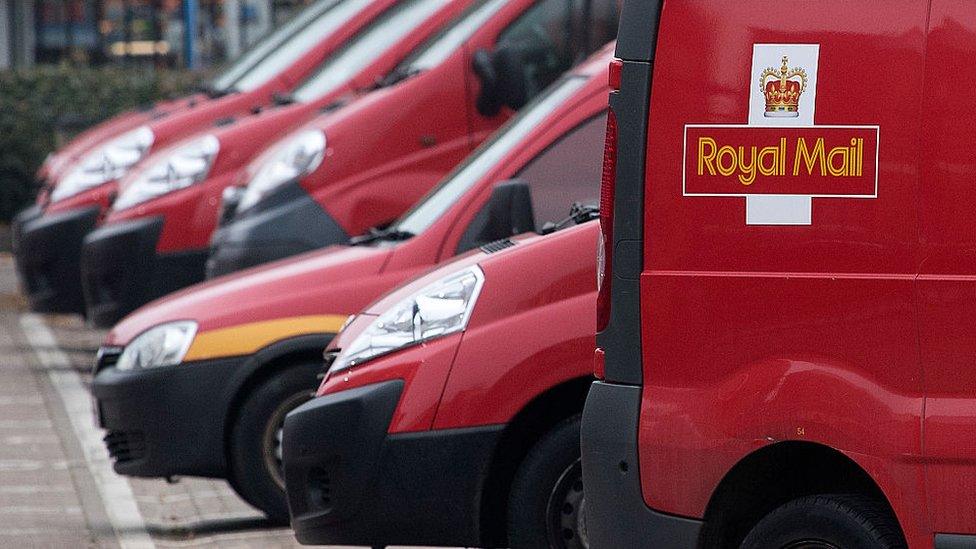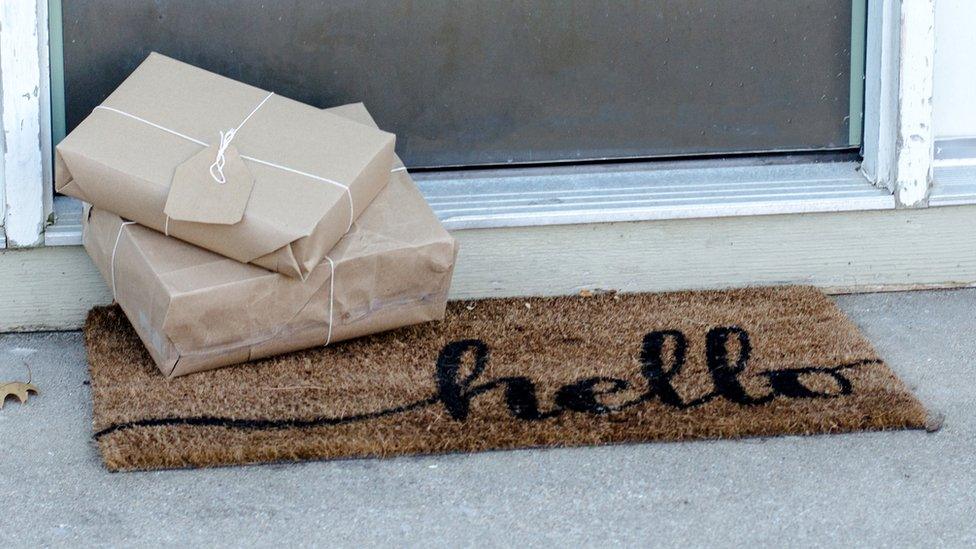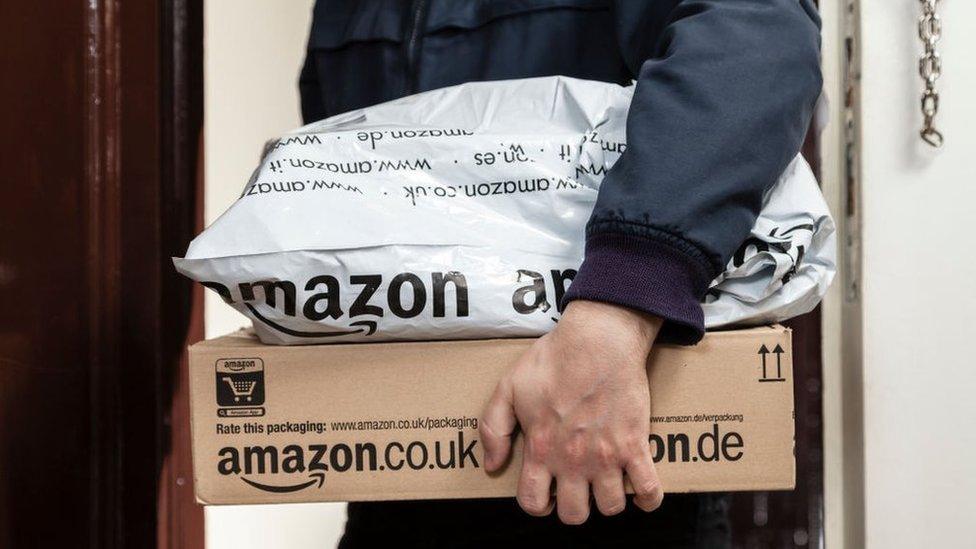NI customers warned over 'Royal Mail' scam messages
- Published

Two scams have been circulating
Royal Mail has warned people in Northern Ireland not to fall for parcel scams circulating by text and email.
Messages bearing the company logo ask for for small payments to ensure letters or parcels are delivered.
One of the scams asks for a payment towards shipping costs, at a time when there has been confusion over deliveries to NI.
Royal Mail said it was aware of the issue and that fraudsters would invent "new and creative" scams.
"Royal Mail Group works hard to prevent and detect fraud," a spokesperson said.

"Royal Mail will only send email and SMS notifications to customers where the sender has requested this when using our trackable products that offer this service.
"The only time we would ask customers to make a payment in an email or SMS is if a customs fee is due.
"In this case, we will also leave a grey card telling them there's a fee to pay, either for the international customs fee or a surcharge for an underpaid item, before we can release the item.
"This may arrive later than the email or SMS."
The company has a page on its website dedicated specifically to highlighting known scams, external using its name.
'Data hacking'
The scams come following the introduction the Irish Sea border at the start of 2020 as a consequence of Brexit.
A grace period for parcels - meaning no new processes are requited for most GB-NI transactions until at least mid-April - was announced in December.
But the announcement came just hours before the Brexit transition period ended and some GB companies and their delivery firms had already taken the decision to add customs labels to parcels going to NI.
Confusion about how the new system works could be behind the strategy of the scammers.
Thomas McGuinness, a software engineer from Belfast who works in cyber-security said he immediately knew it was a scam but one aspect of it intrigued him.
"I was surprised at how they got my name," he said.
"I can easily see how people could be fooled by this as the URL almost looks real and the addition of the actual name as well.
"Unfortunately, people can be put out of pocket very easily by these, especially if they don't know better and think it is actually Royal Mail, which in general is a trusted company."

Thomas McGuinness spotted the scam immediately
He said it raised questions about how easily people's data can be accessed by scammers online, in order to make their schemes seem more legitimate.
"I can only speculate that I entered my phone details on some form online, possibly some silly competition, and that website may then have been hacked," he said.
"There has been a significant increase in recent years of hackers obtaining data dumps and selling them on the dark web.
"So it's more important than ever that companies that store such information have it encrypted, so even if the data is stolen it's not easily decrypted."

'Settlement' is misspelled in the scam text.
Other people have reported receiving the fraudulent text, with one person finding the number it had been sent from was registered to Maharashtra - a state in India.
David West from Dromara, County Down, received a text which said he had missed the delivery of a parcel and that he would be charged £2.99 as a re-delivery fee.
"I didn't believe it one bit as I had nothing coming, but if you had a parcel coming you could have been caught out," he said.
"Especially older people that maybe wouldn't think it was a scam.
"It's about time something is done about all the scams going about."
ScamwiseNI, the police's partnership with community and voluntary organisations, has previously flagged the Royal Mail 're-delivery' scam and advised that the postal company will generally leave a slip for a missed delivery and ask the person to collect the item from a depot.
It also advises that Royal Mail will never ask for personal details over a text message or online and has warned people not to follow the link sent in messages.
Guidance for what people should do if they fall victim to a scam and want to report it, has been issued here., external
Related topics
- Published4 January 2021

- Published22 January 2021
